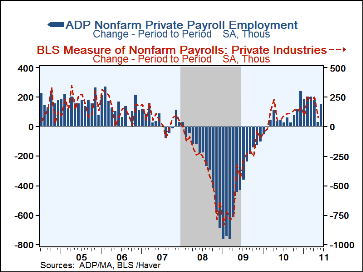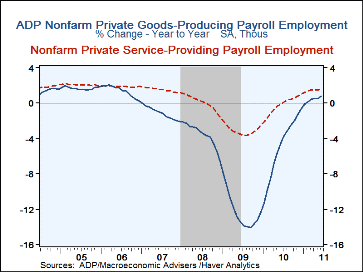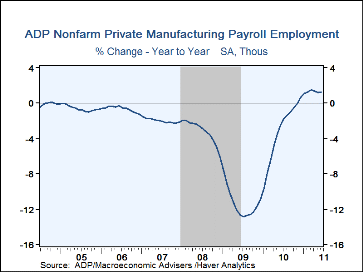 Global| Jul 07 2011
Global| Jul 07 2011ADP Reports Labor Market Healing
by:Tom Moeller
|in:Economy in Brief
Summary
The labor market improved last month after being hit by a tsunami and floods. In its latest National Employment Report, the payroll processor Automatic Data Processing (ADP) and economic consultants Macroeconomic Advisers, indicated [...]
 The labor market improved last month after being hit by a tsunami
and floods. In its latest National Employment Report, the payroll
processor Automatic Data Processing (ADP) and economic consultants
Macroeconomic Advisers, indicated that the June level of private
nonfarm payrolls rose 157,000 after a depressed 36,000 May
increase, revised from 38,000. The latest gain was stronger than
Action Economics' expectation for a 78,000 increase. Nevertheless,
the three-month rate of growth fell to 1.4% (AR) versus the February
peak of 2.4%.
The labor market improved last month after being hit by a tsunami
and floods. In its latest National Employment Report, the payroll
processor Automatic Data Processing (ADP) and economic consultants
Macroeconomic Advisers, indicated that the June level of private
nonfarm payrolls rose 157,000 after a depressed 36,000 May
increase, revised from 38,000. The latest gain was stronger than
Action Economics' expectation for a 78,000 increase. Nevertheless,
the three-month rate of growth fell to 1.4% (AR) versus the February
peak of 2.4%.
The U.S. Bureau of Labor Statistics will report June payroll employment tomorrow. Economists expect a 90,000 worker increase in jobs. For comparison, the May increase of 36,000 in ADP's measure of private nonfarm payrolls was accompanied by an 83,000 rise in the BLS measure of private sector jobs. According to ADP and Macro-Advisers, the correlation between the monthly percentage change in the ADP estimate and that in the BLS data is 0.90. ADP compiled the estimate from its database of individual companies' payroll information. Macroeconomic Advisers, LLC, the St. Louis economic consulting firm, developed the methodology for transforming the raw data into an economic indicator.
Improved m/m job growth was logged for June in all of the ADP categories. However, a 130,000 gain in service-producing payrolls still was down moderately from earlier monthly increases. Goods-producing payrolls also improved by 27,000 but that also was slightly less than earlier gains. Factory sector jobs rose 24,000. Overall, small-sized payrolls grew 88,000 m/m (1.7% y/y) while medium-sized payrolls rose 59,000 (1.8% y/y). Large payrolls rebounded by 10,000 (0.1% y/y). Construction employment fell 4,000 and the number of financial activities jobs slipped 3,000.
The ADP National Employment Report data is maintained in Haver's USECON database; historical figures date back to December 2000. The figures in this report cover only private sector jobs and exclude employment in the public sector. The ADP methodology is explained here. The expectations figures are available in Haver's AS1REPNA database.
| ADP National Employment Report | Jun | May | Apr | Y/Y | 2010 | 2009 | 2008 |
|---|---|---|---|---|---|---|---|
| Nonfarm Private Payroll Employment (m/m Chg., 000s) | 157 | 36 | 188 | 1.5% | -1.1% | -4.8% | -0.6% |
| Small Payroll (1-49) | 88 | 27 | 88 | 1.7 | -0.8 | -3.9 | 0.0 |
| Medium Payroll (50-499) | 59 | 30 | 89 | 1.8 | -1.0 | -5.6 | -0.9 |
| Large Payroll (>500) | 10 | -21 | 11 | 0.1 | -2.0 | -5.6 | -1.9 |
| Goods Producing | 27 | -10 | 39 | 0.7 | -5.1 | -12.3 | -3.6 |
| Manufacturing | 24 | -10 | 22 | 1.3 | -3.3 | -11.3 | -3.2 |
| Service Producing | 130 | 46 | 149 | 1.6 | -0.2 | -3.1 | 0.1 |
Tom Moeller
AuthorMore in Author Profile »Prior to joining Haver Analytics in 2000, Mr. Moeller worked as the Economist at Chancellor Capital Management from 1985 to 1999. There, he developed comprehensive economic forecasts and interpreted economic data for equity and fixed income portfolio managers. Also at Chancellor, Mr. Moeller worked as an equity analyst and was responsible for researching and rating companies in the economically sensitive automobile and housing industries for investment in Chancellor’s equity portfolio. Prior to joining Chancellor, Mr. Moeller was an Economist at Citibank from 1979 to 1984. He also analyzed pricing behavior in the metals industry for the Council on Wage and Price Stability in Washington, D.C. In 1999, Mr. Moeller received the award for most accurate forecast from the Forecasters' Club of New York. From 1990 to 1992 he was President of the New York Association for Business Economists. Mr. Moeller earned an M.B.A. in Finance from Fordham University, where he graduated in 1987. He holds a Bachelor of Arts in Economics from George Washington University.
More Economy in Brief
 Global| Feb 05 2026
Global| Feb 05 2026Charts of the Week: Balanced Policy, Resilient Data and AI Narratives
by:Andrew Cates








